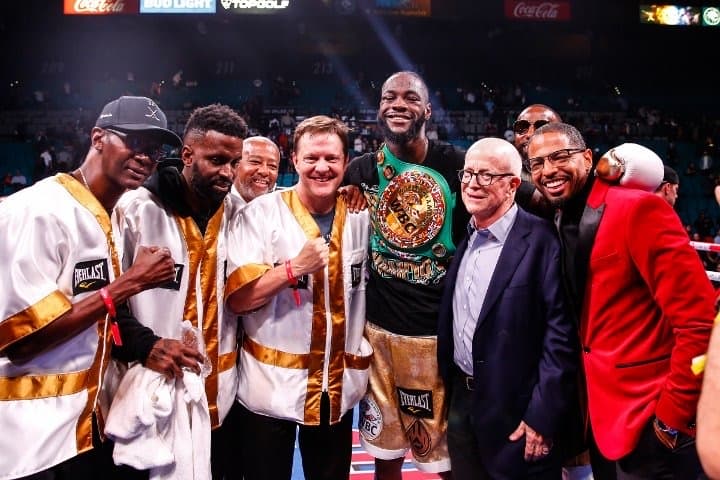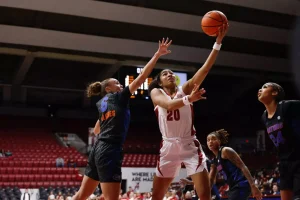Wilder returns to Vegas to defend heavyweight title
Tuscaloosa’s Deontay Wilder won his first major heavyweight title in Las Vegas five years ago. Now one of the premier names in the sport, he returns to MGM Grand Garden Arena on Saturday to defend his crown in one of the biggest fights of his career to this point.
February 20, 2020
Deontay Wilder longs to someday become the undisputed heavyweight champion of the world. The latest obstacle to the Northport-based boxer’s ambitions is a rematch with the only opponent he has ever failed to beat.
On Saturday, Wilder and Britain’s Tyson Fury will step into the ring together for the second time after a high-profile match from December 2018 ended in a controversial draw. Wilder, whose World Boxing Council heavyweight title will again be at stake on Saturday, is vowing to leave no doubt the second time around.
“This is where we come and settle everything. This is judgment day,” Wilder said on a conference call. “This is the moment where everyone will have a clear [conscience] after February 22 about who actually won the first fight.”
Wilder, who at the time sported a perfect 42-0 record, wasn’t himself in that fight, despite knocking Fury down twice. It was already uncommon for a Wilder match to go the full 12 rounds, as 41 of his 42 wins were by knockout, but for him to have two knockdowns and still be in danger of losing the fight was uncharted territory.
“He was just so anxious to have such a great performance and to really show the world what he could do that he pressed a little bit,” said Jay Deas, Wilder’s trainer. “When you try to hit a home run, that’s when you pretty much guarantee that you won’t hit a home run. … He’s learned from it, and I expect everything will be much better this time around.”
Deas said he and the rest of Wilder’s team have managed the hype more effectively than they did for the first fight. They felt that Wilder was exhausted by the constant media attention in 2018, so they consolidated his obligations this time to limit the time commitment.
Preparing a world-class boxer for a fight, especially a fight of this magnitude, is no small task. It takes seven weeks of “camp,” intensive training during which the entire team, from Deas to co-trainer Mark Breland, to co-manager Shelly Finkel, to strength and agility trainers, has to be communicating so they don’t over-work Wilder or make him peak too early.
Four of those seven weeks are sparring weeks. Similar to a “scout team” in team sports, Deas brings in numerous sparring partners to help Wilder prepare for his upcoming opponent. Some are boxers Deas knows well; others are fresh faces he finds on the internet to give Wilder a new challenge. In preparation for Saturday’s fight, Deas brought in sparring partners from St. Louis, Detroit, Los Angeles, New Zealand, Germany and Cuba.
Their job is to give Wilder “the best look possible,” in Deas’ words. For the last seven weeks, that has meant simulating the crafty, well-rounded style of Fury.
“Fury is just really good in all phases of the game, so that’s really where the challenge comes,” Deas said. “He doesn’t have really anything in the way of weaknesses; he’s just a tremendous fighter. He’s got all the heart and the will and the skill.”
Al Bernstein, a Showtime broadcaster who called the first Wilder-Fury fight, called Fury “very, very clever,” and said he thought Wilder’s camp underestimated how difficult he would be to hit.
He also said the British fighter “certainly” won more rounds than Wilder in their first match, estimating that Wilder won four or five of the 12. He also estimated, however, that six out of 10 boxing fans would call Wilder the favorite to win Saturday’s fight.
A typical round awards 19 total points – 10 to the winner and nine to the loser. If a boxer is knocked down, he loses a point for that round, so it becomes a 10-8 round rather than 10-9.
Wilder and Fury’s 2018 match ended in a draw because one judge had Wilder as the winner – one had Fury, and the other had them tied. The first judge had Wilder winning 115-111; accounting for Wilder’s two knockdowns of Fury, that indicates Wilder won seven rounds and Fury won five. Another judge had Fury winning 114-112, meaning he thought Fury had won eight rounds to Wilder’s four. The third judge had Fury winning seven rounds to Wilder’s five, so the final score was a 113-113 draw after subtracting Fury’s 2 points for being knocked down.
On Saturday, Bernstein said, Fury should focus on playing smart and winning rounds so he has a cushion in case he gets knocked down again. For Wilder, the key is patience and not putting himself in a hole where he needs knockdowns to keep the match close.
“[Fury’s] whole mission in this is to avoid being hit with the huge right hand of Wilder,” Bernstein said. “[Wilder] wants to land his big power punches, but in the process of doing that, he can’t give rounds away.”
Fury’s promoter has said that the contract for this fight contains a trilogy clause, which means Wilder and Fury could fight again for the WBC title if the loser of Saturday’s fight requests it within 30 days.
Whether the saga is settled on Saturday or further into the future, the victor’s next target is expected to be Britain’s Anthony Joshua, who holds the three most important heavyweight titles of the other major boxing organizations – the World Boxing Association, the World Boxing Organization and the International Boxing Federation.
That fight, between Joshua and either Wilder or Fury, could potentially be a unification bout to determine who becomes the first heavyweight in two decades to hold all four major titles at the same time.
Deas, though, wouldn’t entertain any ideas about what’s to come, knowing that the task Wilder faces on Saturday isn’t to be overlooked.
“We’ve got a great fight among two undefeated, massive, huge personalities,” Deas said. “Boxer vs. puncher, but the puncher can box and the boxer can punch. It’s everything you could ever want in a fight.”










